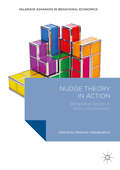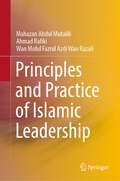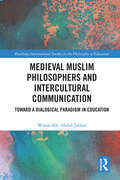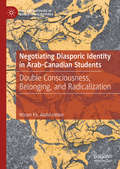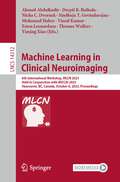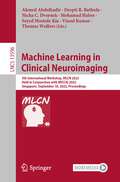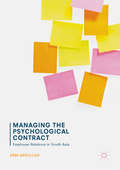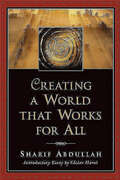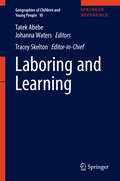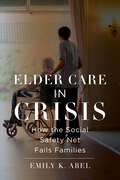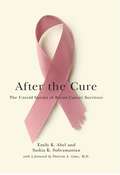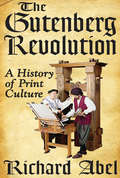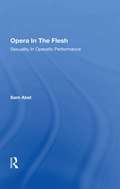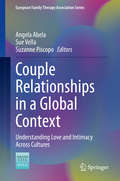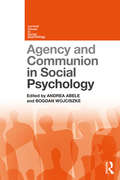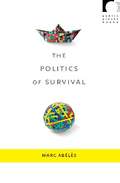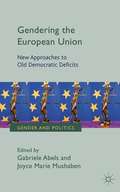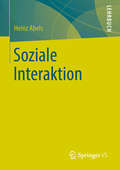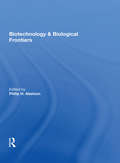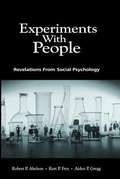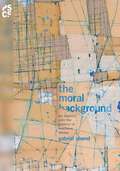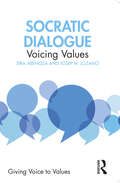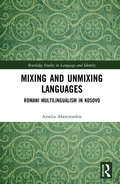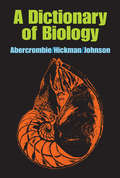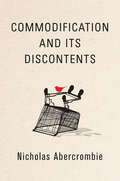- Table View
- List View
Nudge Theory in Action
by Sherzod AbdukadirovThis collection challenges the popular but abstract concept of nudging, demonstrating the real-world application of behavioral economics in policy-making and technology. Groundbreaking and practical, it considers the existing political incentives and regulatory institutions that shape the environment in which behavioral policy-making occurs, as well as alternatives to government nudges already provided by the market. The contributions discuss the use of regulations and technology to help consumers overcome their behavioral biases and make better choices, considering the ethical questions of government and market nudges and the uncertainty inherent in designing effective nudges. Four case studies - on weight loss, energy efficiency, consumer finance, and health care - put the discussion of the efficiency of nudges into concrete, recognizable terms. A must-read for researchers studying the public policy applications of behavioral economics, this book will also appeal to practicing lawmakers and regulators.
Principles and Practice of Islamic Leadership
by Mahazan Abdul Mutalib Ahmad Rafiki Wan Mohd Wan RazaliThis book elaborates the fundamental principles and practices of Islamic leadership and management by highlighting its underlying philosophies, key concepts, and sources. The book closely examines the relationship of Islamic leadership with spiritual leadership and how it shapes the concept of leadership. The book also compares Islamic Leadership with other related spiritual leadership concepts such as the Servant Leadership, religiosity, and other conventional leadership perspectives based on Islamic framework. The chapters within the book delve into Islamic teachings and values from Al-Qur’an and Hadith that can be applied when governing an organization using several case studies. This insightful and thorough discussion on Islamic leadership will be useful as a reference for academic courses on leadership, and current and aspiring business leaders.
Medieval Muslim Philosophers and Intercultural Communication: Towards a Dialogical Paradigm in Education (Routledge International Studies in the Philosophy of Education)
by Wisam Kh. Abdul-JabbarThis book examines the works of Medieval Muslim philosophers interested in intercultural encounters and how receptive Islam is to foreign thought, to serve as a dialogical model, grounded in intercultural communications, for Islamic and Arabic education. The philosophers studied in this project were instructors, tutors, or teachers, such as Al-Kindi, Al-Farabi, Al-Ghazali, and Averroes, whose philosophical contributions directly or indirectly advanced intercultural learning. The book describes and provides examples of how each of these philosophers engaged with intercultural encounters, and asks how their philosophies can contribute to infusing intercultural ethics and practices into curriculum theorizing. First, it explores selected works of medieval Muslim philosophers from an intercultural perspective to formulate a dialogical paradigm that informs and enriches Muslim education. Second, it frames intercultural education as a catalyst to guide Muslim communities’ interactions and identity construction, encouraging flexibility, tolerance, deliberation, and plurality. Third, it bridges the gap between medieval tradition and modern thought by promoting interdisciplinary connections and redrawing intercultural boundaries outside disciplinary limits. This study demonstrates that the dialogical domain that guides intercultural contact becomes a curriculum-oriented structure with Al-Kindi, a tripartite pedagogical model with Al-Fārābī, a sojourner experience with Al-Ghazali, and a deliberative pedagogy of alternatives with Averroes. Therefore, the book speaks to readers interested in the potential of dialogue in education, intercultural communication, and Islamic thought research. Crucially bridging the gap between medieval tradition and modern thought by promoting interdisciplinary connections and redrawing intercultural boundaries outside disciplinary limits, it will speak to readers interested in the dialogue between education, intercultural communication, and Islamic thought. .
Negotiating Diasporic Identity in Arab-Canadian Students: Double Consciousness, Belonging, and Radicalization (Palgrave Studies in Educational Futures)
by Wisam Kh. Abdul-JabbarThis book, framed through the notion of double consciousness, brings postcolonial constructs to sociopolitical and pedagogical studies of youth that have yet to find serious traction in education. Significantly, this book contributes to a growing interest among educational and curriculum scholars in engaging the pedagogical role of literature in the theorization of an inclusive curriculum. Therefore, this study not only recognizes the potential of immigrant literature in provoking critical conversation on changes young people undergo in diaspora, but also explores how the curriculum is informed by the diasporic condition itself as demonstrated by this negotiation of foreignness between the student and selected texts.
Machine Learning in Clinical Neuroimaging: 6th International Workshop, MLCN 2023, Held in Conjunction with MICCAI 2023, Vancouver, BC, Canada, October 8, 2023, Proceedings (Lecture Notes in Computer Science #14312)
by Ahmed Abdulkadir Deepti R. Bathula Nicha C. Dvornek Sindhuja T. Govindarajan Mohamad Habes Vinod Kumar Esten Leonardsen Thomas Wolfers Yiming XiaoThis book constitutes the refereed proceedings of the 6th International Workshop on Machine Learning in Clinical Neuroimaging, MLCN 2023, held in Conjunction with MICCAI 2023 in Vancouver, Canada, in October 2023. The book includes 16 papers which were carefully reviewed and selected from 28 full-length submissions.The 6th International Workshop on Machine Learning in Clinical Neuroimaging (MLCN 2023) aims to bring together the top researchers in both machine learning and clinical neuroscience as well as tech-savvy clinicians to address two main challenges: 1) development of methodological approaches for analyzing complex and heterogeneous neuroimaging data (machine learning track); and 2) filling the translational gap in applying existing machine learning methods in clinical practices (clinical neuroimaging track).The papers are categorzied into topical sub-headings on Machine Learning and Clinical Applications.
Machine Learning in Clinical Neuroimaging: 5th International Workshop, MLCN 2022, Held in Conjunction with MICCAI 2022, Singapore, September 18, 2022, Proceedings (Lecture Notes in Computer Science #13596)
by Ahmed Abdulkadir Deepti R. Bathula Nicha C. Dvornek Mohamad Habes Seyed Mostafa Kia Vinod Kumar Thomas WolfersThis book constitutes the refereed proceedings of the 5th International Workshop on Machine Learning in Clinical Neuroimaging, MLCN 2022, held in Conjunction with MICCAI 2022, Singapore in September 2022. The book includes 17 papers which were carefully reviewed and selected from 23 full-length submissions.The 5th international workshop on Machine Learning in Clinical Neuroimaging (MLCN2022) aims to bring together the top researchers in both machine learning and clinical neuroscience as well as tech-savvy clinicians to address two main challenges: 1) development of methodological approaches for analyzing complex and heterogeneous neuroimaging data (machine learning track); and 2) filling the translational gap in applying existing machine learning methods in clinical practices (clinical neuroimaging track).The papers are categorzied into topical sub-headings: Morphometry; Diagnostics, and Aging, and Neurodegeneration.
Managing the Psychological Contract
by Abm AbdullahThis book explores the differences between Western and non-Western cultures to provide a more comprehensive understanding of psychological contract and its consequences on employees’ behavioral, attitudinal, and cognitive outcomes. Further, it discusses the culturally-relevant elements of HR practices that affect employee expectations, job satisfaction, commitment, and motivation based on their perceptions of the level of fulfilment of their psychological contract. Integrating both qualitative and quantitative methods, it is the first book to examine the current state of the South Asian workforce and will advance research on industrial relations, employee relationship management, and corporate management of South Asian employees around the world.
Creating a World That Works for All
by Sharif M. AbdullahThe world is a mess. The privileged few prosper. The masses suffer. And everyone feels spiritually empty. Most people would blame capitalism, racism, or some other "ism". But according to Sharif M. Abdullah, the problem is not ideology. It's exclusivity -- our desire to stay separate from other people. In Creating a World That Works for All, Abdullah takes a look at the mess we live in -- and presents a way out. To restore balance to the earth and build community, he says, people must stop blaming others, embrace inclusivity, and become "menders". He outlines three simple tests -- for "enoughness", exchangeability, and common benefit -- to guide people as they transform themselves and the world.
Laboring and Learning
by Tatek Abebe Johanna WatersThis volume incorporates ground-breaking new academic perspectives on the contributions that children and young people make to societies around the world, with a particular focus on learning and work. The chapters in the volume offer conceptual and empirical insights into how young people learn to labour, and the complex social, spatial, temporal, institutional and relational processes that informs their engagements in daily, generational and social reproduction. The editors have intentionally avoided using the terms 'education' and 'employment' in the title, as this volume is an attempt to capture the multitude of ways, spaces and contexts (not just 'formal') in which learning takes place and work is carried out. Here, learning indicates education in the broadest possible sense, to incorporate not just formal schooling and the acquisition of institutionally recognised academic knowledge and credentials, but also informal learning (including socialization and the on-the-job acquisition of skills that takes place almost imperceptibly, over time). In addition to the theoretical perspectives this volume brings on young people's education and work, other prominent conceptual themes present throughout the work are mobilities, transitions and gender. Following four initial chapters that engage with conceptual issues, the remainder of the volume is divided into two sections, entitled 'spaces of labouring and learning' and 'livelihoods, transitions and social reproduction'. Within these sections, a broad spectrum of empirical chapters demonstrates how young people live, learn and labour in Africa, Asia, Europe and Latin America. These include, among others, geographies of education; interface between migration, learning and livelihoods; cultural politics of human capital formation; schooling and work; citizenship education; families and parenting; socialization and informal education; education-induced migration; processes and practices of inclusion and exclusion in educational institutions; part-time work; domestic work; care work; informal livelihoods; entrepreneurship; social transitions; and a wide range of social, economic, cultural, political (structural) forces that intersect and dissect these topics. As the reader will become aware, there is no such thing as a standard educational or work trajectory, a 'normal' transition or a straight forward relationship between work, education and social reproduction. Indeed, one of the aims of the volume is deliberately to showcase the diversity that young people's lives hold in this regard.
Elder Care in Crisis: How the Social Safety Net Fails Families (Health, Society, and Inequality #2)
by Emily K. AbelExplains why there is a crisis in caring for elderly people and how the COVID-19 pandemic exacerbated itBecause government policies are based on an ethic of family responsibility, repeated calls to support family members caring for the burgeoning elderly population have gone unanswered. Without publicly funded long-term care services, many family caregivers cannot find relief from obligations that threaten to overwhelm them. The crisis also stems from the plight of direct care workers (nursing home assistants and home health aides), most of whom are women from racially marginalized groups who receive little respect, remuneration, or job security. Drawing on an online support group for people caring for spouses and partners with dementia, Elder Care in Crisis examines the availability and quality of respite care (which provides temporary relief from the burdens of care), the long, tortuous process through which family members decide whether to move spouses and partners to institutions, and the likelihood that caregivers will engage in political action to demand greater public support. When the pandemic began, caregivers watched in horror as nursing homes turned into deathtraps and then locked their doors to visitors. Terrified by the possibility of loved ones in nursing homes contracting the disease or suffering from loneliness, some caregivers brought them home. Others endured the pain of leaving relatives with severe cognitive impairments at the hospital door and the difficulties of sheltering in place with people with dementia who could not understand safety regulations or describe their symptoms. Direct care workers were compelled to accept unsafe conditions or leave the labor force. At the same time, however, the disaster provided an impetus for change and helped activists and scholars develop a vision of a future in which care is central to social life.Elder Care in Crisis exposes the harrowing state of growing old in America, offering concrete solutions and illustrating why they are necessary.
After the Cure: The Untold Stories of Breast Cancer Survivors
by Emily K. Abel Saskia K. Subramanian2009 Choice Outstanding Academic Title2009 Association of American University Presses Award for Jacket DesignChemo brain. Fatigue. Chronic pain. Insomnia. Depression. These are just a few of the ongoing, debilitating symptoms that plague some breast-cancer survivors long after their treatments have officially ended. While there are hundreds of books about breast cancer, ranging from practical medical advice to inspirational stories of survivors, what has been missing until now is testimony from the thousands of women who continue to struggle with persistent health problems.After the Cure is a compelling read filled with fascinating portraits of more than seventy women who are living with the aftermath of breast cancer. Emily K. Abel is one of these women. She and her colleague, Saskia K. Subramanian, whose mother died of cancer, interviewed more than seventy breast cancer survivors who have suffered from post-treatment symptoms. Having heard repeatedly that "the problems are all in your head," many don't know where to turn for help. The doctors who now refuse to validate their symptoms are often the very ones they depended on to provide life-saving treatments. Sometimes family members who provided essential support through months of chemotherapy and radiation don't believe them. Their work lives, already disrupted by both cancer and its treatment, are further undermined by the lingering symptoms. And every symptom serves as a constant reminder of the trauma of diagnosis, the ordeal of treatment, and the specter of recurrence.Most narratives about surviving breast cancer end with the conclusion of chemotherapy and radiation, painting stereotypical portraits of triumphantly healthy survivors, women who not only survive but emerge better and stronger than before. Here, at last, survivors step out of the shadows and speak compellingly about their "real" stories, giving voice to the complicated, often painful realities of life after the cure.This book received funding from the Susan G. Komen Foundation.
The Gutenberg Revolution: A History of Print Culture
by Richard AbelOne of the most puzzling lapses in accounts of the rise of the West following the decline of the Roman Empire is the casual way historians have dealt with Gutenberg's invention of printing. The cultural achievements that followed the fifteenth century, when the West moved from relative backwardness to remarkable, robust cultural achievement, would have been impossible without Gutenberg's gift and its subsequent widespread adoption across most of the world.Richard Abel follows the radical cultural impact of the printing revolution from the eighth century to the Renaissance, addressing the viability of the new Christian/Classical culture. Although this culture proved too fragile to endure, those who salvaged it managed to preserve elements of the Classical substance together with the Bible and all the writings of the Church Fathers. The cultural upsurge of the Renaissance (fourteenth to seventeenth centuries), which resulted in part from Gutenberg's invention, is a major focus of this book.Abel aims to delineate how the cultural revolution was shaped by the invention of printing. He evaluates its impact on the rapid reorientation and acceleration of the cultural evolution in the West. This book provides insight into the history of the printed word, the roots of modern-day mass book production, and the promise of the electronic revolution. It is an essential work in the history of ideas.
Opera In The Flesh: Sexuality In Operatic Performance
by Sam AbelVerdi, Wagner, polymorphous perversion, Puccini, Brunnhilde, Pinkerton, and Parsifal all rub shoulders in this delightful, poetic, insightful, sexual book sprung by one man's physical response to the power and exaggeration we call opera. Sam Abel applies a light touch as he considers the topic of opera and the eroticized body: Why do audiences respond to opera in a visceral way? How does opera, like no other art form, physically move watchers? How and why does opera arouse feelings akin to sexual desire? Abel seeks the answers to these questions by examining homoerotic desire, the phenomenon of the castrati, operatic cross-dressing, and opera as presented through the media. In this deeply personal book, Abel writes, ‘These pages map my current struggles to pin down my passion for opera, my intense admiration for its aesthetic forms and beauties, but much more they express my astonishment at how opera makes me lose myself, how it consumes me.’ In so doing, Abel uncovers what until now, through dry musicology and gossipy history, has been left behind a wall of silence: the physical and erotic nature of opera. Although Abel can speak with certainty only about his own response to opera, he provides readers with a language and a resonance with which to understand their own experiences. Ultimately, Opera in the Flesh celebrates the power of opera to move audiences as no other book has done. It is indeed a treasure of scholarship, passion, and poetry for everyone with even a passing interest in this fascinating art form.
Couple Relationships in a Global Context: Understanding Love and Intimacy Across Cultures (European Family Therapy Association Series)
by Angela Abela Sue Vella Suzanne PiscopoThis book examines the significance of the couple relationship in the 21st century, exploring in depth how couple relationships are changing in different parts of the world. It highlights global trends and cultural variations that are shaping couple relationships. The book discusses diverse relationships, such as intercultural couples, same sex couples, long distance couples, polygynous marriages, and later life couples. In addition, chapters offer suggestions for ways to best support couples through policy, clinical practices, and community support. The book also investigates aspects of a relationship that help predict fidelity and stability. Topics featured in this book include:Couple relationships when one partner has an acquired physical disability.Impact of smartphones on relationships.Online dating and its implications for couple relationships.Assessment and intervention in situations of infidelity and non-monogamy.Parenting interventions for the transition from partnership to parenthood.Online couple psychotherapy to support emotional links between long distance partners. Couple Relationships in a Global Context is an essential resource for researchers, professors, and graduate students as well as clinicians and practitioners in family therapy, clinical psychology, general practice/family medicine, social work, and related psychology and medical disciplines.
Agency and Communion in Social Psychology (Current Issues In Social Psychology Ser.)
by Andrea E. Abele Bogdan WojciszkeWhat are the ultimate motives that instigate individuals’ behaviours? What are the aims of social perception? How can an individuals’ behaviour be described both from the perspective of the actor and from the perspective of an observer? These are the basic questions that this book addresses using its proposed agency-communion framework. Agency (competence, assertiveness) refers to existence of an organism as an individual, to "getting ahead" and to individual goal-pursuit; communion (warmth, morality) refers to participation of an individual in a larger organism, to "getting along" and to forming bonds. Each chapter is written by experts in the field and use the agency-communion framework to explore a wide variety of topics, such as stereotypes, self-esteem, personality, power, and politics. The reader will profit from the deep insights given by leading researchers. The variety of theoretical approaches and empirical contributions shows that the parsimonious and simple structure of two types of content in behavior, motives, personality, self-concept, stereotypes, and more to build an overarching frame to different phenomena studied in psychology.
The Politics of Survival
by Marc AbélésIn this provocative analysis of global politics, the anthropologist Marc Abls argues that the meaning and aims of political action have radically changed in the era of globalization. As dangers such as terrorism and global warming have moved to the fore of global consciousness, foreboding has replaced the belief that tomorrow will be better than today. Survival, outlasting the uncertainties and threats of a precarious future, has supplanted harmonious coexistence as the primary goal of politics. Abls contends that this political reorientation has changed our priorities and modes of political action, and generated new debates and initiatives. The proliferation of supranational and transnational organizations--from the European Union to the World Trade Organization (WTO) to Oxfam--is the visible effect of this radical transformation in our relationship to the political realm. Areas of governance as diverse as the economy, the environment, and human rights have been partially taken over by such agencies. Non-governmental organizations in particular have become linked with the mindset of risk and uncertainty; they both reflect and help produce the politics of survival. Abls examines the new global politics, which assumes many forms and is enacted by diverse figures with varied sympathies: the officials at meetings of the WTO and the demonstrators outside them, celebrity activists, and online contributors to international charities. He makes an impassioned case that our accounts of globalization need to reckon with the preoccupations and affiliations now driving global politics. The Politics of Survival was first published in France in 2006. This English-language edition has been revised and includes a new preface.
Gendering the European Union
by Gabriele Abels Joyce Marie MushabenAn exploration of European integration as seen through a gender lens. This book looks at integration theories, institutional relationships, enlargement, the development of gender law and the role of formal actors, scholars and expert networks in the EU policy-making process. With a focus on gender mainstreaming as a new approach to gender policy.
Soziale Interaktion
by Heinz AbelsDie Einführung macht in verständlicher Sprache mit interpretativen Theorien vertraut. Es werden die wichtigsten Annahmen von George Herbert Mead zum Thema Identität und von Herbert Blumer zur symbolischen Interaktion dargestellt. Anschließend wird die phänomenologische Grundlegung der Soziologie durch Alfred Schütz nachgezeichnet und vor diesem Hintergrund die Theorie der gesellschaftlichen Konstruktion der Wirklichkeit von Peter L. Berger und Thomas Luckmann skizziert. Im letzten Teil werden die Ethnomethodologie nach Harold Garfinkel als eine Theorie des Handelns im Alltag vorgestellt und aus den Arbeiten von Erving Goffman Techniken der Präsentation behandelt.
Biotechnology And Biological Frontiers
by Philip H AbelsonSplit into two sections, Part I of this volume from Science is devoted to a broad sampling of the status of a revolution in applied biology. The emphasis of Part II in this volume is fundamental research rather than techniques or practical applications.
Experiments With People: Revelations From Social Psychology
by Robert P. Abelson Aiden P. Gregg Kurt P. FreyExperiments With People showcases 28 intriguing studies that have significantly advanced our understanding of human thought and social behavior. These studies, mostly laboratory experiments, shed light on the irrationality of everyday thinking, the cruelty and indifference of 'ordinary' people, the operation of the unconscious mind, and the intimate bond between the self and others. This book tells the inside story of how social psychological research gets done and why it matters. Each chapter focuses on the details and implications of a single study, but cites related research and real-life examples. All chapters are self-contained, allowing them to be read in any order. Each chapter is divided into: *Background--provides the rationale for the study;*What They Did--outlines the design and procedure used; *What They Found--summarizes the results obtained;*So What?--articulates the significance of those results; *Afterthoughts--explores the broader issues raised by the study; and*Revelation--encapsulates the 'take-home message' of each chapter.This paperback is ideal as a main or supplementary text for courses in social psychology, introductory psychology, or research design.
The Moral Background: An Inquiry into the History of Business Ethics (Princeton Studies in Cultural Sociology #60)
by Gabriel AbendIn recent years, many disciplines have become interested in the scientific study of morality. However, a conceptual framework for this work is still lacking. In The Moral Background, Gabriel Abend develops just such a framework and uses it to investigate the history of business ethics in the United States from the 1850s to the 1930s.According to Abend, morality consists of three levels: moral and immoral behavior, or the behavioral level; moral understandings and norms, or the normative level; and the moral background, which includes what moral concepts exist in a society, what moral methods can be used, what reasons can be given, and what objects can be morally evaluated at all. This background underlies the behavioral and normative levels; it supports, facilitates, and enables them.Through this perspective, Abend historically examines the work of numerous business ethicists and organizations—such as Protestant ministers, business associations, and business schools—and identifies two types of moral background. "Standards of Practice" is characterized by its scientific worldview, moral relativism, and emphasis on individuals' actions and decisions. The "Christian Merchant" type is characterized by its Christian worldview, moral objectivism, and conception of a person's life as a unity.The Moral Background offers both an original account of the history of business ethics and a novel framework for understanding and investigating morality in general.
Socratic Dialogue: Voicing Values (Giving Voice to Values)
by Sira Abenoza Josep M. LozanoGiving Voice to Values is a very important tool that has helped many professionals better align what they do with what they value and believe. This book introduces the methodology of Socratic Dialogue as a complementary set of tools for creating spaces of joint reflection in which one can gain clarity about one’s values and gain the confidence to voice them effectively. Socrates’ main concern was to progressively reach a higher alignment between ideas and actions: that is, to achieve a harmony between what we think, what we say and what we do. The first step to giving voice to our values involves introspection and dialogue with others – which is how we can become aware of what we really think and value. An examined life, Socrates reminds us, is a fulfilled one. Based on the authors' more than ten years’ experience teaching Socratic Dialogue to business and law students, executives and professionals, faculty, incarcerated people and other vulnerable groups, the book provides teachers and practitioners with a roadmap to conceive, design and conduct Socratic Dialogue courses and sessions. It provides context for the method and its adaptation to the challenges of the 21st century. The book also offers guidance on how to structure a Socratic Dialogue classroom, as well as a series of tried-and-true activities and exercises, practical recommendations and testimonies of the transformative impact that dialogue courses have had on participants. The book is of prime interest to professors and educators of business ethics, as well as professional consultants working to help organizations become more responsible and introduce ethical reasoning in their decisions. It also serves as a valuable resource for social educators and practitioners in prisons and rehabilitation units, as well as teachers in primary and secondary education.
Mixing and Unmixing Languages: Romani Multilingualism in Kosovo (Routledge Studies in Language and Identity)
by Amelia AbercrombieMixing and Unmixing Languages uses the politics and practices of language to understand social hierarchies and social change in a post-conflict and post-socialist context. The book focuses on Roma in Prizren, Kosovo, where the author conducted long-term ethnographic fieldwork, using language learning as a central method. Shifts in language practices among this highly multilingual group have reflected the demise of Yugoslav socialism, the rise of ethno-nationalist politics and conflict, and the post-war reversal of power relations in Kosovo. Roma in Prizren nostalgically narrate a past of cosmopolitanism and employment in contrast to the present. Their position today is complex: while they stress their relative integration, this position is fragile in the face of nationalist politics and imported neoliberal economic policies. Within this context, Roma NGO workers have found an economic niche working on projects to protect multiculturalism and minorities, funded by international aid agencies, centred on Romani language. This book discusses the historical trajectory and current configurations of a Romani organisation in the town, the standardisation of Romani and the hierarchical organisation of linguistic forms and language learning, the self-representation of Roma and the ‘gypsy’ image through Romani-language drama, and attitudes to purism, mixing and cosmopolitanism. Mixing and Unmixing Languages is suitable for academics and students in the areas of linguistic anthropology and linguistic ethnography, Romani studies, South-East European studies and sociolinguistics.
A Dictionary of Biology
by M. Abercrombie C.J. Hickman M.L Johnson"A Dictionary of Biology" is an up-to-date reference work explains several thousand specialized words that allow for empirical approaches to the biological sciences. It includes more than bare definitions, including information about most of the things named so as to convey their significance in biological discussion. M. Abercrombie, C. J. Hickman, and M. L. Johnson in effect interpret this language as it is actually used, emphasizing customary usage rather than etymology.This comprehensive lexicon includes two thousand entries. Many unfamiliar terms, especially the rarer ones, are defined with the help of other technical terms, perhaps equally unfamiliar. This trick of dictionary-makers could only be avoided by giving a complete account of a large part of biology under each heading. Every biological technical term used in a definition is itself defined elsewhere in the dictionary; though some semi-technical terms, words that can be found in any English dictionary are omitted.The authors use codes throughout the dictionary to help the reader to interpret the use of a word such as whether it is used in relation to plants and animals only, whether the word is an adjective, and when a term is defined elsewhere and adds information to the current definition. The result is an invaluable guide for the layman, the student, and the scholar alike. It presents clear and authoritative explanations of the terms and will remain useful as a quick and concise source of reference.
Commodification and Its Discontents
by Nicholas AbercrombieShould human organs be bought and sold? Is it right that richer people should be able to pay poorer people to wait in a queue for them? Should objects in museums ever be sold? The assumption underlying such questions is that there are things that should not be bought and sold because it would give them a financial value that would replace some other, and dearly held, human value. Those who ask questions of this kind often fear that the replacement of human by money values – a process of commodification – is sweeping all before it. However, as Nicholas Abercrombie argues, commodification can be, and has been, resisted by the development of a moral climate that defines certain things as outside a market. That resistance, however, is never complete because the two regimes of value – human and money – are both necessary for the sustainability of society. His analysis of these processes offers a thought-provoking read that will appeal to students and scholars interested in market capitalism and culture.
